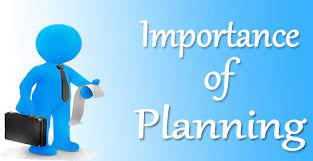
A plan is a roadmap for future actions. It's a cerebral activity that involves imagination, foresight, and good judgment. We must ponder before acting.
This step prepares the process by outlining upcoming actions. Planning is a basic management function that involves anticipating, setting goals, assessing various courses of action, and selecting the most effective way to perform management activities to achieve these goals.
Therefore, it's a continuous process that involves decision-making, which entails determining how to define and achieve goals.
This instalment introduces Pan African Entrepreneurs to the benefits and drawbacks of planning, a key cornerstone of entrepreneurial success.
Planning is crucial since it determines future actions.
Goal setting should be a priority for any company. Planning develops goals in advance, unifying direction. Plan carefully to accomplish clear goals.
This helps management focus on the end goal, despite the numerous tasks.
Planning minimises pointless activity and elevates it.
- Zanu PF shadow MP guns for Binga DDC
- Dangers of Arab Spring in SA
- Zimra introduces automated systems to curb corruption
- Antipas scoops monthly PSL awards
Keep Reading
Planning decreases uncertainty. Every business must face uncertainty. Planning helps a corporation navigate uncertainty by eliminating superfluous actions. Preparing for the future helps prepare for potential threats.
Plans are made with the organisation's goal in mind, reducing overlap and waste. For a strategy to succeed, all departments must participate. Planning reduces overlap and waste.
Planning inspires creativity and innovation. It assists the company and encourages creative thinking. Managers generate ideas that are used to develop new products and services, helping the firm to flourish.
It is widely understood that an efficient planning process produces a diverse array of new ideas and motivates managers to think differently, which enhances individual participation.
Planning simplifies decision-making. A decision involves weighing options and selecting the best one.
Planning aids managers in envisioning the future and choosing among various options. Planning steers effective, productive decision-making.
Planning sets performance standards for evaluation and monitoring. The sixth and final benefit of planning is setting a control benchmark.
Comparing actual performance to specified standards identifies deviations and allows remedial actions to ensure events match the planned.
Any divergence can be corrected by management to improve results.
Despite its strategic importance, planning presents many obstacles, as seen below:
Planning can render the workplace inflexible by necessitating adherence to established policies.
Individuals might become more focused on following these rules than on achieving their goals if they adhere strictly to them.
Preparation can, at times, stifle creativity and initiative. It restricts their flexibility and diminishes fresh opportunities.
In a changing environment, planning may fail. Planning must take into account government rules, technology, and other external influences.
Changing conditions can make any strategy ineffectual and unworkable. Thus, planning fails when changes are not expected.
Planning regulations and procedures ahead of time hinders creativity for three reasons. Employees must strictly adhere to these policies, and any deviation is highly undesirable. Workers struggle to demonstrate their skills, which hinders initiative and innovation.
Researching and assessing information incurs significant costs, leading to expensive planning. It also requires financial compensation for professionals due to their planning expertise.
Efforts should focus on maximising the benefits of analysis and ensuring that the advantages of planning exceed its costs. Planning should be reconsidered if the benefits do not outweigh the expenses.
Planning is time-consuming. Collecting, evaluating, and interpreting planning data requires time. This obstructs decision-making. Crisis and emergency situations necessitate rapid decisions, rendering preparedness ineffective. Advance preparation can stall action, resulting in lost opportunities.
Planning may provide the organisation with a false sense of security, suggesting it does not ensure success. Managers often adopt established plans, but it's unclear if they'll work in this competitive market. Thus, planning does not guarantee success.
The employee resists change because they're used to it. They resist change and a new career path. Lack of willingness could doom the strategy.
We must plan again because of the 18/20 rule. Unplanned activities are known to yield less than 20% of the outcome from 80% of the effort. One should take time to decide what to do, when, and how.
Without this, many unnecessary, misdirected, and wasteful steps may arise.
These planning constraints highlight the challenges of planning, but they can be surmounted with a few intentional steps. Adjusting a strategy to prevent a problem is easier than fixing it later.
Until then, think, eat, sleep, and dream about branding!
*Dr Farai Chigora is a businessman and academic. He is the head of business science at Africa University’s College of Business, Peace, Leadership, and Governance. His doctoral research focused on Business Administration (Destination Marketing and Branding Major, UKZN, SA). He can be contacted for feedback at [email protected] or via WhatsApp mobile: +263772886871.
*Dr Tabani Moyo is an extra-ordinary researcher with the University of North West, South Africa’s Social Transformation School. He holds a Doctorate in Business Administration (Research focus on new media and corporate reputation management, UKZN), chartered marketer, fellow CIM, communications and reputation management expert based in Harare. He can be contacted at [email protected] @TabaniMoyo (X)











